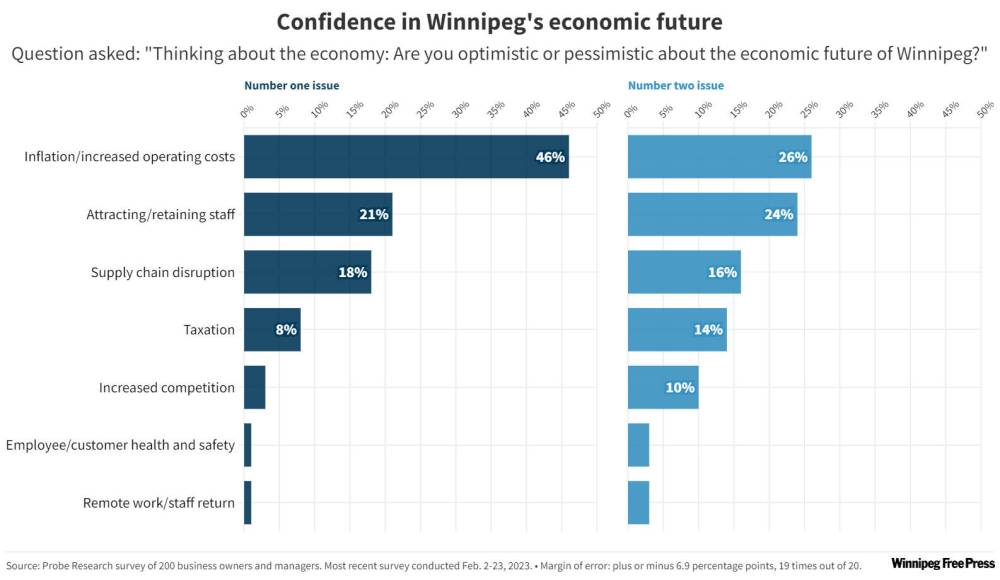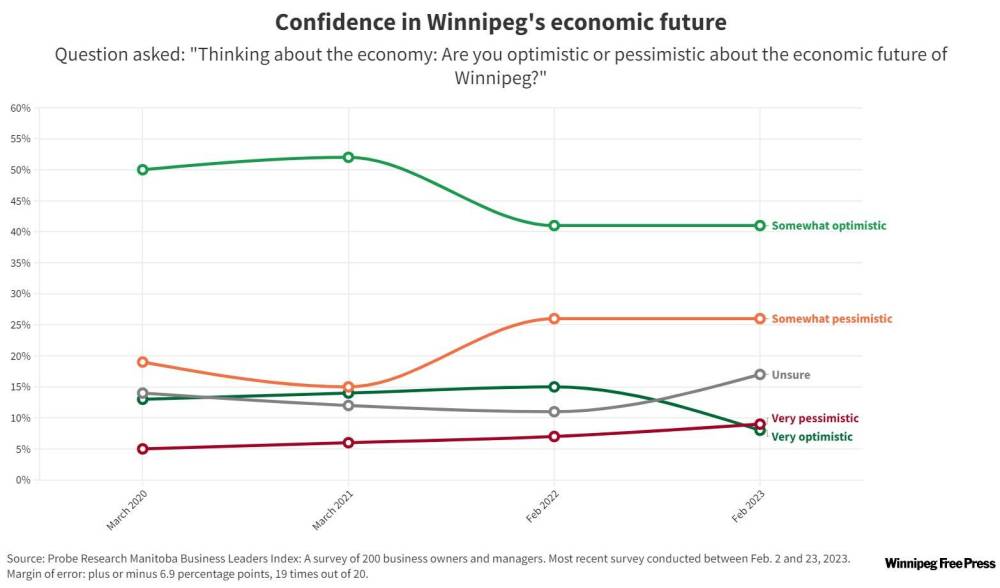Inflation top concern: poll
Economic situation improves, but nervousness, uncertainty remain
Advertisement
Read this article for free:
or
Already have an account? Log in here »
To continue reading, please subscribe:
Monthly Digital Subscription
$1 per week for 24 weeks*
- Enjoy unlimited reading on winnipegfreepress.com
- Read the E-Edition, our digital replica newspaper
- Access News Break, our award-winning app
- Play interactive puzzles
*Billed as $4.00 plus GST every four weeks. After 24 weeks, price increases to the regular rate of $19.00 plus GST every four weeks. Offer available to new and qualified returning subscribers only. Cancel any time.
Monthly Digital Subscription
$4.75/week*
- Enjoy unlimited reading on winnipegfreepress.com
- Read the E-Edition, our digital replica newspaper
- Access News Break, our award-winning app
- Play interactive puzzles
*Billed as $19 plus GST every four weeks. Cancel any time.
To continue reading, please subscribe:
Add Free Press access to your Brandon Sun subscription for only an additional
$1 for the first 4 weeks*
*Your next subscription payment will increase by $1.00 and you will be charged $16.99 plus GST for four weeks. After four weeks, your payment will increase to $23.99 plus GST every four weeks.
Read unlimited articles for free today:
or
Already have an account? Log in here »
Hey there, time traveller!
This article was published 11/03/2023 (958 days ago), so information in it may no longer be current.
Scott MacKay figures if there’s one word to describe the mood of respondents in Probe Research’s 2023 Manitoba Business Leaders Index, it’s grumpy.
The cause of that dark cloud is inflation.
The president of Probe, who has been doing these surveys for many years, said that with 72 per cent saying that inflation concerns ranked as the No. 1 or No. 2 challenges — 62 per cent more than attracting staff, which has been a major thorn in the side of business operators — it is clearly the overwhelming issue of the day.
Scott MacKay, president of Probe Research, says rising inflation is chief among Manitoban’s concerns. (Phil Hossack / Winnipeg Free Press files)
“People just don’t know what to do about it,” said MacKay. “It’s not something most have ever had to deal with and it is making everyone a little nervous and grumpy.”
MacKay said it colours other aspects of the survey, maybe even the dampening appreciation of governments’ performance.
The 200 respondents from across the province expressed a much more jaundiced view of government performance compared to a couple of years ago.
For instance, in 2021 when the federal government was sending out regular CERB cheques to people whose workplaces had been suspended, 40 per cent said they thought the federal government was doing an excellent or good job.
This year it is down to 15 per cent.
The provincial government did not fare much better. In 2020, 45 per cent were raving about the provincial government. This year it is down to 21 per cent.
People had a much kinder take on municipal governments, especially in rural municipalities where they are more likely to be praised — 34 per cent versus 15 per cent among the Winnipeg-based businesses who say the City of Winnipeg does an excellent or good job.
“The federal government seems to have taken the brunt of the criticism,” said MacKay. “Now that the smoke has cleared (from the pandemic disruptions) I think some of the deficiencies of what may be seen as a tired minority federal government are baked into that number.”
Despite the dim view of government, concerns about inflation and worry about a possible recession, 69 per cent said their sales are the same or better than before the pandemic and 94 per cent said their businesses were fully back up and running.

But issues such as challenges finding employees were still sky-high at 70 per cent, compared to only 52 per in 2019.
And confidence levels regarding Winnipeg’s economic future have dimmed.
In March 2021, a year into the pandemic, 64 per cent said they were somewhat or very optimistic about the economic future of Winnipeg.
The numbers of those who still maintain that sentiment has slumped to 49 per cent.
“That’s a helluva drop. Is it just about inflation? I don’t know,” said MacKay.
All that nervousness and uncertainty is happening at the same time that their current economic situation is getting better.
More than 70 per cent reported that their businesses are the same or better off than a year ago — up from 56 the previous year — but only 34 per cent expect to be better off next year, a drop of close to 10 per cent from the previous two years.
With so many businesses saying they are having a hard time finding workers, it’s not surprising that only 10 per cent say they are likely to lay staff off over the next six months.
Probe introduced a new line of questioning for the first time this year regarding concerns about cyberattacks.

“Before we went out into the field we asked our clients if there were any issues simmering in the background and many mentioned cybersecurity issues. Several were saying they were very distracted by it.”
What the survey found was that 16 per cent of respondents said they had been victims of a cyberattack or hack, which may be under-reported because many businesses do not like to disclose that fact — and more than two-thirds have it on their minds.
“It is a real worry. People just don’t know how big it is and these are the first local statistic that show how big a deal it really is,” MacKay said.
Probe spoke to 200 business owners and managers throughout the province between Feb. 2 and 23. The survey sample includes employers of staff, medium-sized and large businesses.
With that size of a survey Probe can say with 95 per cent certainty that results are within 6.9 percentage points plus or minus of what they would have been if all employers in the province were surveyed.
martin.cash@freepress.mb.ca


